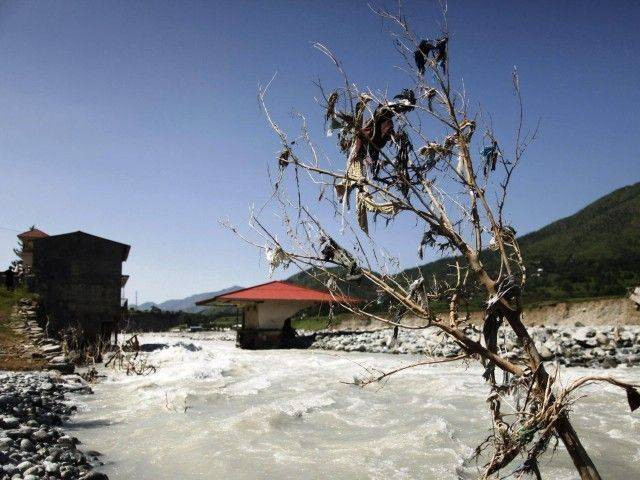Disaster mitigation: Seek out-of-the-box solutions, says Wattoo
Parliamentarians, MoCC officials offer suggestions from China’s Yangtze River basin

PHOTO: REUTERS
PML-N’s Muhammad Moeen Wattoo, MoCC Secretary Abu Akif Ahmad, and Inspector General of Forests Mehmood Nasir said the country was highly vulnerable to floods, which caused wide-scale damages to socioeconomic sectors, particularly agriculture.
In a weekly media briefing at MOCC on Tuesday, they said the main objective of a recent ten-day visit to the Yangtze River basin in China was to see how the Chinese manage flood plains and use floods for economic and environmental gain.
They said that with effective management of river basins, including the Indus, and restoration of wetlands in the country, flood risks could be mitigated. Such measures could also increase underground water resources, which are depleting fast.
“Of all the devastating impacts of climate change being experienced by the country, floods are proving to be more destructive, causing losses worth billions of rupees,” Wattoo said.
It was surely amazing the way China has managed to mitigate the flood risk in the Yangtze River basin spread over catchment area of 1.8 million square kilometers With a total length of more than 6,300 kilometers and a total descent of more than 5,400 meters.
The Yangtze River is the third longest river in the world and offers a great lesson for Pakistan to make the flood-prone Indus River basin a flood-proof river basin in light of the Chinese experience, he elaborated.
“We also learnt during our visit that effective river basin management and restoration of wetlands can help significantly to mitigate flood risks being faced by Pakistan,” the MNA emphasised.
He said he would convey our observations on sustainable flood management to the prime minister and the top political leadership.
Parliamentarians Wattoo and Pakhtunkhwa Milli Awami Party MNA Abdul Qahar Wadan were part of a 10-member delegation that visited the Yangtze River basin to take stock of the measures taken by the Chinese government to tackle flooding and how these measures can be replicated in Pakistan.
Climate Change Secretary Akif said Pakistan had been declared water-stressed country, with storage capacity of only 30 days. On the other hand, “carryover capacity” in other countries ranges from 200 days in India to 1,000 days in Egypt, he said.
He said what was more alarming was that the storage capacity was decreasing day-by-day due to sediment build-up in existing reservoirs.
Published in The Express Tribune, June 16th, 2016.



















COMMENTS
Comments are moderated and generally will be posted if they are on-topic and not abusive.
For more information, please see our Comments FAQ